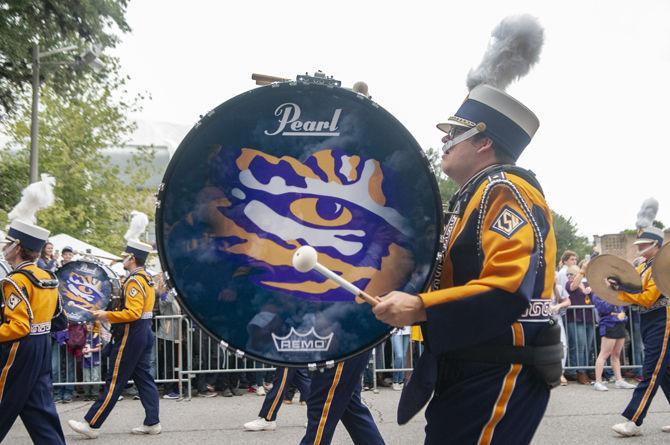When the Louisiana State University Marching Band plays the iconic first four notes of the LSU “Pregame” before a football game, the crowd goes wild, but Kelvin Jones wants audiences to know the band is so much more than those four notes.
After working with the 325-member Golden Band from Tigerland for seven years, Jones was promoted to the interim associate director of bands this year. He is now responsible for the marching band, color guard and Golden Girls, as well as the symphonic winds ensemble and undergraduate and graduate band courses.
Jones’ time with the band started when he was a member of the LSU marching band. After graduation, Jones returned to the band as a graduate assistant. Jones said his hardworking philosophy comes from his grandfather.
“As my grandfather told me, who was also a band director, ‘those who are good are going to work hard,’” Jones said. “‘You’re going to spend a lot of time in the morning and a lot of time after rehearsal trying to get it done right. For those who are mediocre or bad, they won’t.’”
Jones’ handwork pays off during Saturday gamedays. Jones starts with morning band rehearsal and warm-ups in the Greek Amphitheater. The band then marches down Victory Hill and performs in front of, then inside, the Pete Maravich Assembly Center.
Once Jones and the band march into Tiger Stadium, they perform for several hours. Following the pre-game performance featuring the “Pregame” song, the band plays stand-tunes throughout the game and performs during halftime. Jones’ Saturdays finally end with a review of the night’s halftime performance in the Band Hall after the game ends.
Despite the busyness of Saturdays in Death Valley, Jones said he never feels stressed on gamedays.
“Gamedays are the least stressful days I ever have,” Jones said. “By that point, either we got it or we don’t.”
Jones said the only times he feels stressed are moments leading up to Saturday game days when the band practices less than usual due to inclement weather.
One person helping ease Jones’ stress is music performance junior and 2019-2020 LSU Marching Band Drum Major Taylor Brownfield, who works closely with Jones.
“He’s somewhat like a father figure because we have done so much together, and he has helped me within this position,” Brownfield said. “He’s also given me pointers about music in general because I am a music performance major.”
Brownfield’s duties as drum major include leading the band performances and rehearsals, facilitating auditions and trips and serving as a liaison between the marching band management and band members. Through it all, he has noticed Jones is a “very personal person.” Brownfield said Jones had learned all 325 band members’ names after a week-long band camp over the summer. Jones said his motivation for forming more personal connections with students is more than just a matter of politeness.
“It’s more or less my philosophy,” Jones said. “Yes, I’m a conductor and a music educator but you deal with people first. Before I can correct a student, I need to know about that person first.”
Brownfield attests to Jones’ memorizing of band members’ names, saying that because Jones knows each member personally, he is able to encourage them and energize them in ways he otherwise could not.
Forming connections with each band member is especially important to Jones because the marching band is a group of hardworking, diverse people.
“We work with music majors, but music majors make up less than 25% of the band,” Jones said. “I get to be around extremely smart students. The highest number [of band members] percentage wise are engineering and science majors. We are one of the only organizations on campus that has a student from every college.”
Jones said there are only a handful of downsides to his job. He said it’s frustrating to keep Tiger Stadium a family-friendly environment when students make-up lyrics for certain songs the band plays in the stands.
“The students have spent all this time working on the tune, and then they [fans] start singing ridiculous things and we can’t do it anymore,” Jones said.
Jones also wishes he could change the 325 member-cap for the marching band. The band is capped because of the seating availability in Tiger Stadium, costs for buses and meals and the $1000 stipend each student receives. Jones said turning students away breaks his heart, but the band program tries to open its doors to others by allowing non-Tiger Band members to join Bengal Brass, the LSU pep-band that plays during smaller sporting events.
Because of these challenges, Jones believes aspiring band directors should adopt the virtue of patience.
“If I could say patience infinity times I would,” Jones said. “You’re dealing with kids and parents, and you’re going to need patience in developing relationships, community and the program. It takes time.”
“LSU Tiger Band is never going to change what we do,” Jones said. “But how you can put your influence to hopefully improve the program is what matters.”
Jones hopes fans recognize the Golden Band from Tigerland shows up to every game to perform for the fans and team they love so much.
“There’s a whole lot that goes into, ‘Oh, I hear four notes,’” Jones said.
After working with the 325-member Golden Band from Tigerland for seven years, Jones was promoted to the interim associate director of bands this year. He is now responsible for the marching band, color guard and Golden Girls, as well as the symphonic winds ensemble and undergraduate and graduate band courses.
Jones’ time with the band started when he was a member of the LSU marching band. After graduation, Jones returned to the band as a graduate assistant. Jones said his hardworking philosophy comes from his grandfather.
“As my grandfather told me, who was also a band director, ‘those who are good are going to work hard,’” Jones said. “‘You’re going to spend a lot of time in the morning and a lot of time after rehearsal trying to get it done right. For those who are mediocre or bad, they won’t.’”
Jones’ handwork pays off during Saturday gamedays. Jones starts with morning band rehearsal and warm-ups in the Greek Amphitheater. The band then marches down Victory Hill and performs in front of, then inside, the Pete Maravich Assembly Center.
Once Jones and the band march into Tiger Stadium, they perform for several hours. Following the pre-game performance featuring the “Pregame” song, the band plays stand-tunes throughout the game and performs during halftime. Jones’ Saturdays finally end with a review of the night’s halftime performance in the Band Hall after the game ends.
Despite the busyness of Saturdays in Death Valley, Jones said he never feels stressed on gamedays.
“Gamedays are the least stressful days I ever have,” Jones said. “By that point, either we got it or we don’t.”
Jones said the only times he feels stressed are moments leading up to Saturday game days when the band practices less than usual due to inclement weather.
One person helping ease Jones’ stress is music performance junior and 2019-2020 LSU Marching Band Drum Major Taylor Brownfield, who works closely with Jones.
“He’s somewhat like a father figure because we have done so much together, and he has helped me within this position,” Brownfield said. “He’s also given me pointers about music in general because I am a music performance major.”
Brownfield’s duties as drum major include leading the band performances and rehearsals, facilitating auditions and trips and serving as a liaison between the marching band management and band members. Through it all, he has noticed Jones is a “very personal person.” Brownfield said Jones had learned all 325 band members’ names after a week-long band camp over the summer. Jones said his motivation for forming more personal connections with students is more than just a matter of politeness.
“It’s more or less my philosophy,” Jones said. “Yes, I’m a conductor and a music educator but you deal with people first. Before I can correct a student, I need to know about that person first.”
Brownfield attests to Jones’ memorizing of band members’ names, saying that because Jones knows each member personally, he is able to encourage them and energize them in ways he otherwise could not.
Forming connections with each band member is especially important to Jones because the marching band is a group of hardworking, diverse people.
“We work with music majors, but music majors make up less than 25% of the band,” Jones said. “I get to be around extremely smart students. The highest number [of band members] percentage wise are engineering and science majors. We are one of the only organizations on campus that has a student from every college.”
Jones said there are only a handful of downsides to his job. He said it’s frustrating to keep Tiger Stadium a family-friendly environment when students make-up lyrics for certain songs the band plays in the stands.
“The students have spent all this time working on the tune, and then they [fans] start singing ridiculous things and we can’t do it anymore,” Jones said.
Jones also wishes he could change the 325 member-cap for the marching band. The band is capped because of the seating availability in Tiger Stadium, costs for buses and meals and the $1000 stipend each student receives. Jones said turning students away breaks his heart, but the band program tries to open its doors to others by allowing non-Tiger Band members to join Bengal Brass, the LSU pep-band that plays during smaller sporting events.
Because of these challenges, Jones believes aspiring band directors should adopt the virtue of patience.
“If I could say patience infinity times I would,” Jones said. “You’re dealing with kids and parents, and you’re going to need patience in developing relationships, community and the program. It takes time.”
“LSU Tiger Band is never going to change what we do,” Jones said. “But how you can put your influence to hopefully improve the program is what matters.”
Jones hopes fans recognize the Golden Band from Tigerland shows up to every game to perform for the fans and team they love so much.
“There’s a whole lot that goes into, ‘Oh, I hear four notes,’” Jones said.







